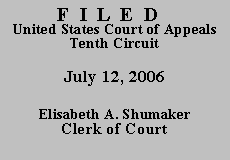

| UNITED STATES OF AMERICA, |
(D.C. Nos. 05-CV-543-C and 04-CR-81-C) |
Mr. Williams pleaded guilty to interstate transportation of a minor female with intent that the minor engage in prostitution, a violation of 18 U.S.C. § 2423. His plea agreement with the government provided that Mr. Williams
knowingly and voluntarily waives his right to:
a. Appeal or collaterally challenge his guilty plea and any other aspect of his conviction, including but not limited to any rulings on pretrial suppression motions or fany other pretrial disposition of motions and issues.
b. Appeal, collaterally challenge, or move to modify under 18 U.S.C. § 3582(c)(2) or some other ground, his sentence as imposed by the Court and the manner in which the sentence is determined, provided the sentence is within or below the applicable guideline range determined by the Court to apply to this case. Defendant acknowledges that this waiver remains in full effect and is enforceable, even if the Court rejects one or more of the positions of the United States or the defendant in paragraph 7 concerning the application of the U.S. Sentencing Guidelines.(1)
Rec. vol. I, doc. 83, at 5 (Plea Agreement, signed June 14, 2004). The district court sentenced Mr. Williams to a term of 120 months' imprisonment. Mr. Williams did not file a direct appeal of his conviction and sentence.
On May 16, 2005, Mr. Williams filed the instant 28 U.S.C. § 2255 motion to vacate, set aside, or correct his sentence. He argued that he had received ineffective assistance of counsel in violation of his Sixth Amendment rights because his counsel failed to (1) file a direct appeal, as Mr. Williams had requested; (2) challenge his sentence on appeal based upon United States v. Booker, 543 U.S. 220 (2005); and (3) challenge his classification as a career offender.
The district court held an evidentiary hearing and heard testimony from Mr. Williams and his trial counsel. Mr. Williams testified that he called his trial counsel within twenty-four hours of the sentencing hearing and requested that she file an appeal. In contrast, his trial counsel testified that Mr. Williams had called her but that the two had discussed the fact that he had waived his right to appeal except in limited circumstances. His counsel denied that Mr. Williams had ever instructed her to file an appeal.
After hearing the testimony, the district court found Mr. Williams's counsel credible and did not believe Mr. Williams's own account of their conversation. The court therefore concluded that "[Mr.] Williams did not instruct his counsel to file an appeal." Rec. vol. I. doc. 133, at 4 (Mem. Op. Jan. 11, 2006). It thus rejected Mr. Williams's first claim for ineffective assistance of counsel.
The court also rejected Mr. Williams's other claims. In light of its finding that Mr. Williams had not instructed his counsel to appeal his conviction and sentence, it concluded that his counsel was not ineffective for failing to raise a Booker claim on appeal. As to the claim involving his career offender classification, the court concluded that it was barred by the waiver of collateral review in the plea agreement.
In order to obtain a COA, Mr. Williams must make "a substantial showing of the denial of a constitutional right." 28 U.S.C. § 2253(c)(2). Mr. Williams may make this showing by demonstrating that "reasonable jurists could debate whether (or, for that matter, agree that) the petition should have been resolved in a different manner or that the issues presented were adequate to deserve encouragement to proceed further." Miller-El v. Cockrell, 537 U.S. 322, 336 (2003) (internal quotation marks omitted). "[A] claim can be debatable even though every jurist of reason might agree, after the COA has been granted and the case has received full consideration, that [the] petitioner will not prevail." Id. at 338.
Here, for substantially the same reasons set forth by the district court, we conclude that Mr. Williams is not entitled to a COA. The district court made its finding that Mr. Williams had not instructed his counsel to appeal after hearing testimony from both parties, and there is no indication that the finding is clearly erroneous. See United States v. Pearce, 146 F.3d 771, 774 (10th Cir. 1998) ("[W]e review the district court's . . . findings of fact [on a § 2255 motion] for clear error."). In light of that finding, Mr. Williams's counsel was not ineffective for failing to file an appeal and failing to raise a Booker claim on appeal. Mr. Williams's claim involving his counsel's failure to challenge his classification as a career offender also lacks merit. As noted by the district court, such a challenge is barred by the plea agreement.
Accordingly, we DENY Mr. Williams's application for a COA, and we DISMISS this matter.
Entered for the Court,
Robert H. Henry
Circuit Judge
1. In paragraph 7 of the plea agreement, the parties agreed that Mr. Williams should receive a two-level downward adjustment for acceptance of responsibility pursuant to USSG § 3E1.1(a) if he committed no further crimes and complied with the plea agreement and that to the extent he qualified for that downward adjustment, the government would move for an additional one-level downward adjustment under § 3E1.1.